What To Pack for A Safari in Kenya?
What to pack for a safari in Kenya depends on the type of trip you choose and the time of the year you travel. Kenya is a big country, and the weather is very different in different places.
The mountains, like Mount Kenya and the Ngong Hills, are cooler, while the coastal cities like Mombasa and Lamu are much hotter.
Whether you are going on safari in the Masai Mara or taking an overland trip through the Amboseli National Park, here are some important things to pack for your Kenya safari.
We suggest you pack as light as possible so you can carry and lift your own bag and walk with it for short distances. Most travelers find a backpack easier to use than a suitcase.
A small overnight bag with a shoulder strap is also fine if you pack light.
Backpacks with wheels are helpful, but we suggest your bag also has straps for carrying. You will also need a small day bag for water, a camera, snacks, and other things you need for day trips.
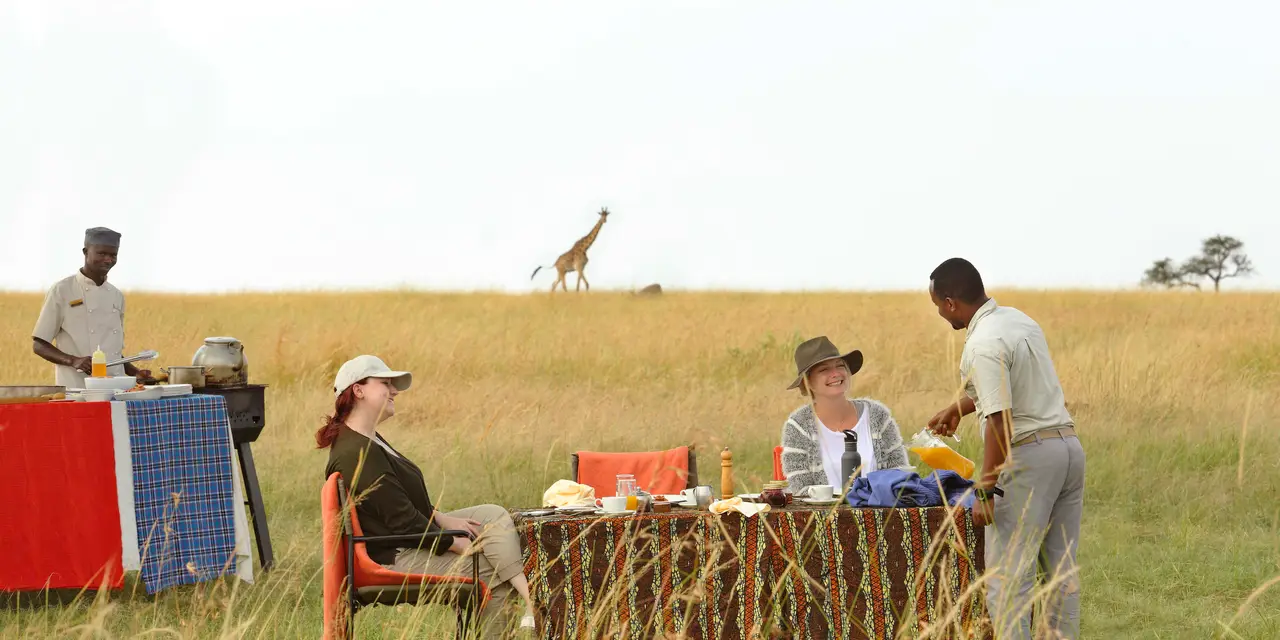
Kenya safari packing list essentials
Closed-Toe Walking Boots
If your safari in Kenya includes walking in the bush or camping, we strongly suggest bringing comfortable closed-toe walking boots.
These boots give extra support and cushioning, protect your ankles, and prevent cuts or scratches when walking through grass or bushes.
They also help protect you from insect bites or stings.
Light, Loose Clothing
Pack lightweight clothes that you can wear in layers.
Knee-length shorts, long pants, and long-sleeved shirts are great for warm weather, and they also protect your skin from the sun and mosquitoes.
Bring some warm clothes for the evenings when it can get cooler.
Choose breathable fabrics like cotton or linen, and avoid nylon or other synthetic materials as they can be uncomfortable in hot weather.
Do not wear ex-military or military-style clothing.
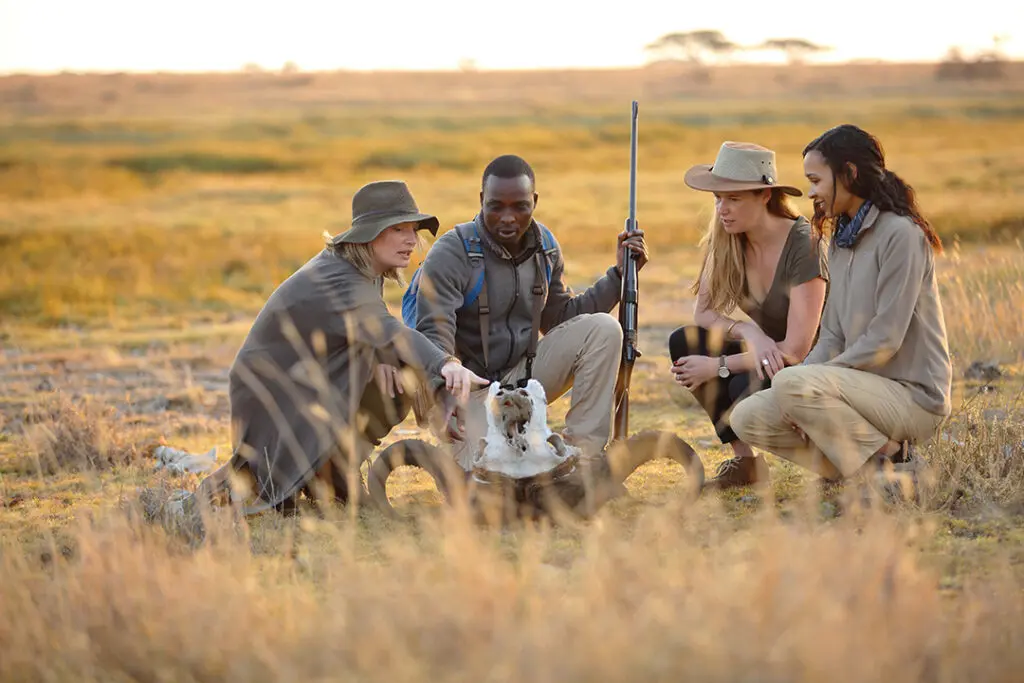
Smart Casual Outfits
It’s a good idea to pack one or two smart casual outfits for evenings out, such as drinks or dinner.
A pair of jeans with a nice shirt or blouse is perfect.
Sandals
Along with hiking shoes, pack a pair of sandals or flip-flops for relaxing at your accommodation, going out for a meal, or taking a casual walk.
They are light, comfortable, and easy to slip on and off.
Warm Fleece and Beanie
Days in Kenya are warm most of the year, but mornings and evenings can be cold, especially during game drives.
Bring a warm fleece or jumper and a beanie to keep you comfortable when the temperature drops after sunset or before sunrise.
Sun Protection
Kenya is on the equator, so the sun is very strong all year.
Pack a wide-brimmed hat, sunscreen, and sunglasses (polarised ones are best).
Choose water-resistant sunscreen with a high SPF to protect your skin while you are out exploring.
Travel Towel
A quick-dry towel is light, dries very fast, and is perfect for camping or showering on the go.
It takes up very little space in your bag, making it much more practical than a regular towel.
Toiletries
Most camps and lodges in Kenya provide shampoo, conditioner, and soap, so you only need to bring these if you prefer your own brands.
Be sure to pack essentials like a toothbrush, toothpaste, floss, deodorant, moisturizing lotion, lip balm, antibacterial hand gel (useful for stops in the wild), a hairbrush or comb, contact lens solution if needed, wet wipes, and feminine hygiene products if required.
To save space and weight, transfer your toiletries into small travel-sized bottles with screw tops, and choose compact versions of toothpaste and hairbrushes when possible.
Waterproof Toiletry Bag
A waterproof toiletry bag is far more practical than a soft fabric one.
You can hang it in the shower, and it will keep your clothes and other items dry — especially useful if you are staying in camps with basic shower facilities.
Headlamp
A bright headlamp or flashlight is very useful for moving around the campsite at night.
Many camps have little or no lighting and rely on generators that turn off early.
While the camp may provide lamps during mealtimes, having your own headlamp helps you find your way to the bathroom and safely walk around the camp after dark.
Personal Medical Kit
Your guides will have a big first aid kit, but it’s a good idea to bring a small personal kit too.
This will help with small cuts, insect bites, blisters, or sunburn.
You don’t need anything fancy. Just pack some antibacterial wipes, a little antiseptic cream, band-aids, tweezers, and calamine lotion or aloe vera gel to soothe your skin.
It’s also smart to bring some mild painkillers, electrolyte tablets, and medicine for diarrhea in case you have stomach problems.
Insect Repellent
Mosquitoes are common in Kenya, especially during the rainy seasons, and they can carry diseases like malaria.
Bring a large bottle of insect repellent and use it generously on your skin to stop bites, especially on your ankles and areas not covered by clothes.
Water bottle
We suggest bringing a water bottle that holds at least 1.5 litres.
Kenya is hot most of the year, so it’s very important to stay hydrated.
Using a reusable bottle also helps reduce plastic waste and protect the environment.
Camera
A camera is a must when you visit Kenya for a safari holiday.
You will see amazing wildlife and scenery that you will want to capture.
Many smartphones have great cameras now, but if you want better photos, bring a proper camera.
Don’t forget to pack extra batteries or a charger to keep your camera powered during your trip.
If you are a serious photographer, bring a backup hard drive for your photos.
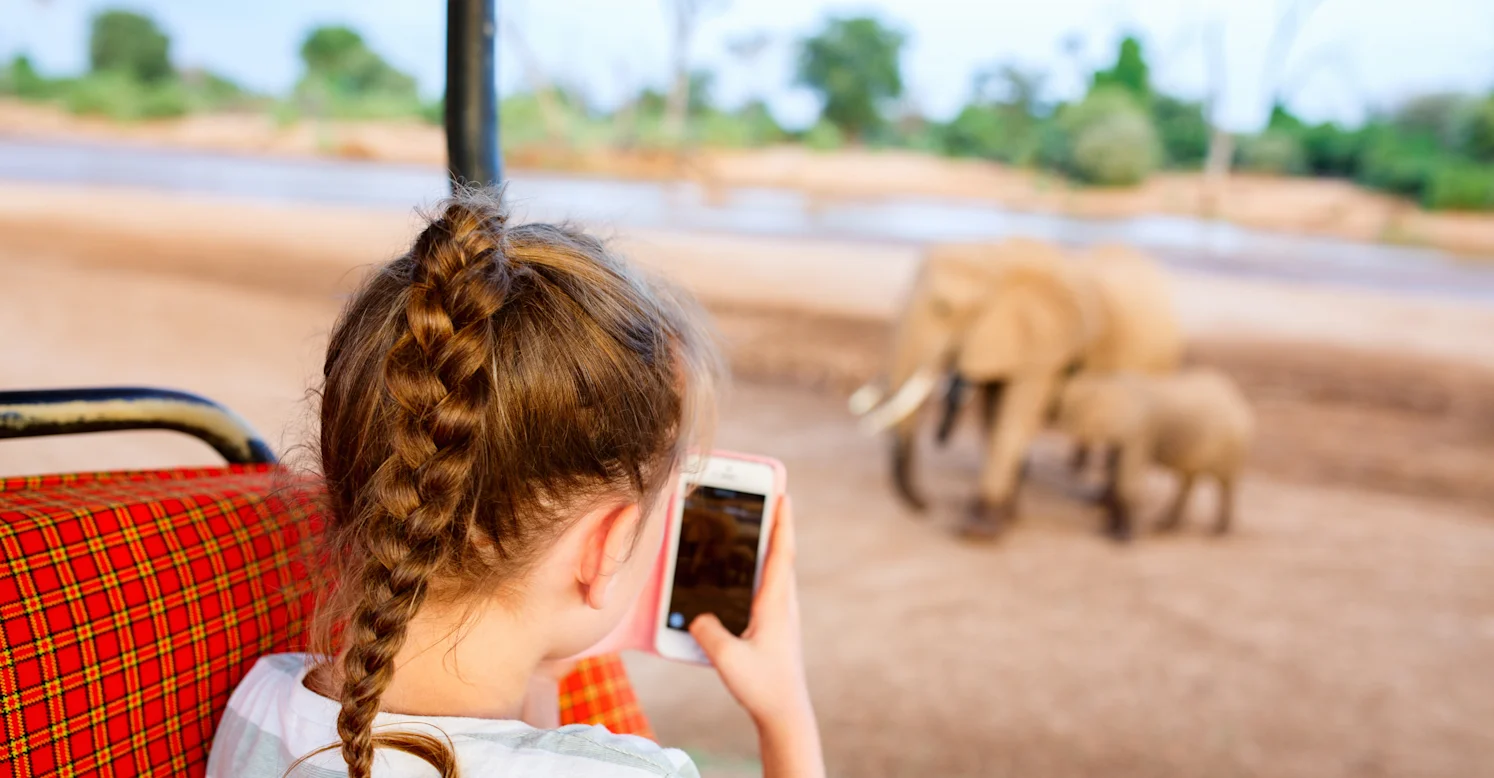
AC Plug Adapter (3-Prong Square)
Bring an AC plug adapter that fits East Africa’s 3-prong square sockets.
This will ensure you can charge your devices easily during your safari.
Waterproof/Windproof Jacket
Kenya has one or two rainy seasons each year, so depending on when you visit, you might need a light waterproof jacket.
It will also keep you warm during cool or windy mornings and evenings.
Copies of Your Important Documents
Always carry hard copies of your visa, passport, travel insurance, plane tickets, emergency contacts, and other important papers.
This way, if your phone is lost or stops working, you still have access to these essential documents.
Nice-to-haves Items For Your Kenya Safari
Binoculars
Binoculars are not a must-have like clothes or shoes, but they can really improve your safari experience.
Kenya is full of amazing animals like lions, elephants, and wildebeest.
You will often see them close from your jeep, but sometimes they can be far away.
A good pair of binoculars will help you see the wildlife more clearly and enjoy the view even better.
Lightweight binoculars and extra batteries or a solar charger for your devices are very useful.
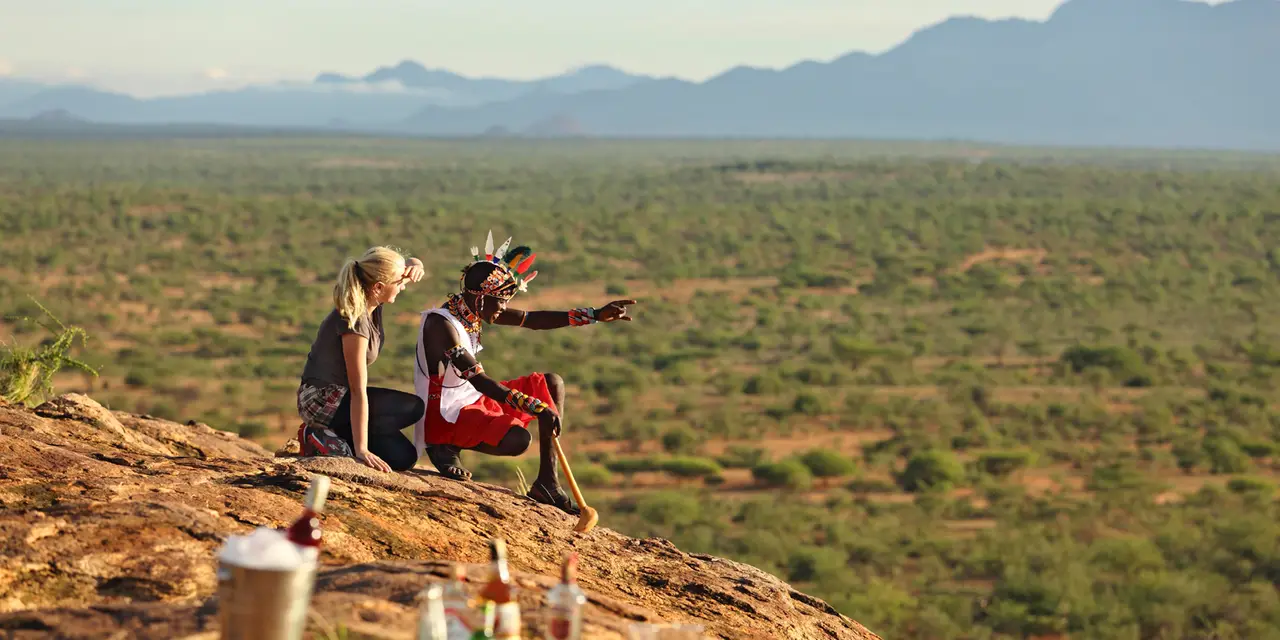
Sleep Sheet
If you are travelling to Kenya in the hot season, a sleep sheet can be useful.
It is not essential, but it helps you stay comfortable whatever the weather is like.
Thermarest
Most places, including campsites, provide a basic mattress.
But you might want to bring a Thermarest for extra comfort and a better night’s sleep.
Earplugs
You might share a room with someone who snores.
Earplugs can help you sleep well even if there is noise.
You will probably be very tired each day, but it is still a good idea to bring earplugs just in case.
A good book, journal or earphones
You will spend a lot of time traveling by vehicle on your Kenya safari trip.
A good book, a travel journal, or a pair of earphones to listen to music or podcasts can help pass the time.
These are also great to have if you want some quiet time in the evening away from your group.
A travel journal is a nice way to write down memories, funny moments, stories you hear, or the names of places and foods you try during your safari.
Travel pillow
A travel pillow is great for supporting your neck.
A lightweight pillow helps prevent neck pain during long journeys and stops you from accidentally nodding off on your neighbor’s shoulder!
Mesh Laundry Bag for Dirty Clothes
Bring a mesh laundry bag to keep your dirty clothes separate from clean ones. It’s lightweight, breathable, and helps your laundry dry faster if you wash clothes during your trip.
Inconspicuous Money Belt
You can bring a discreet money belt to keep your cash, cards, and important documents safe and close to your body while traveling.
It helps protect your valuables from theft and gives you peace of mind.
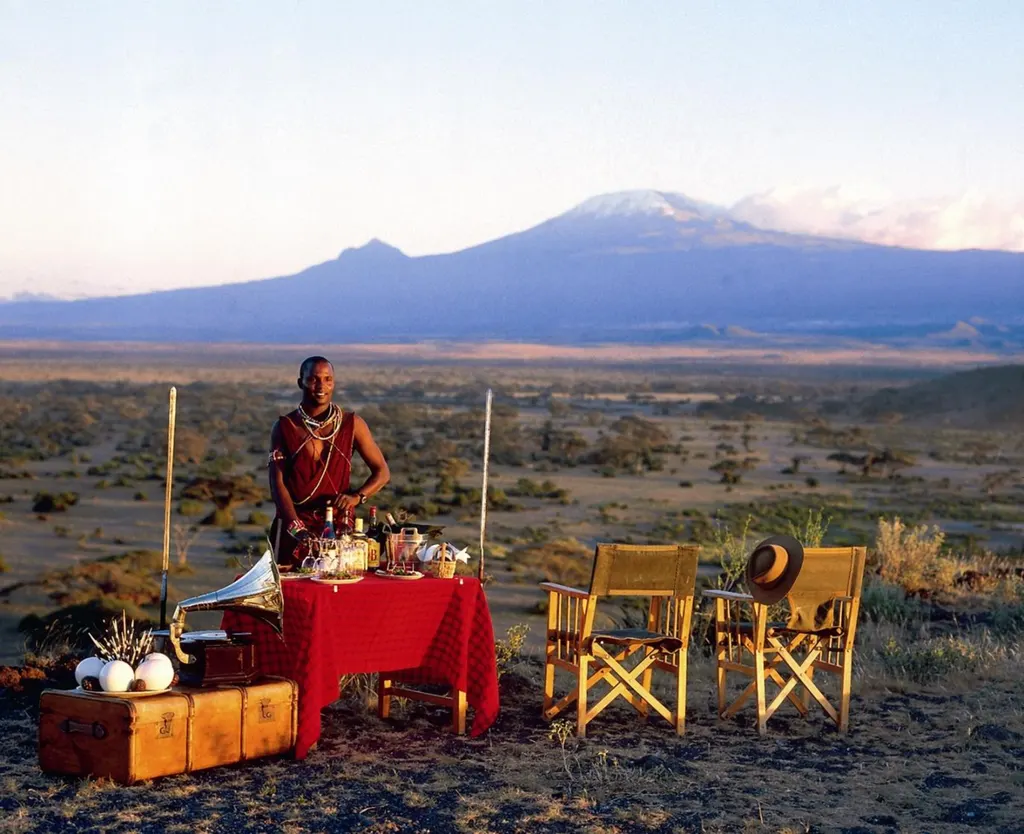
What Should You Not Bring to Kenya?
Most African countries have banned single-use plastics, and Kenya is no different.
This is because non-biodegradable plastics harm the environment and wildlife. In 2020, President Uhuru Kenyatta passed a law that bans all plastics in protected areas of Kenya.
When you pack for your safari, make sure your luggage does not include any plastic items that could pollute the environment.
Some common single-use plastics banned in Kenya are:
- Zip-lock bags
- Grocery bags
- Garbage bags
- Duty-free bags
- Plastic water bottles
- Plastic bread bag tags
- Styrofoam takeaway containers
- Straws
- Plastic packaging
- Plastic cutlery
Other things you can leave behind when packing for your Kenya safari trip include:
- Camo-print clothing
- Expensive or delicate jewellery
- Drones
- High-voltage beauty tools like hairdryers and straighteners
- Strong-smelling perfumes or sprays
our Kenya safaris
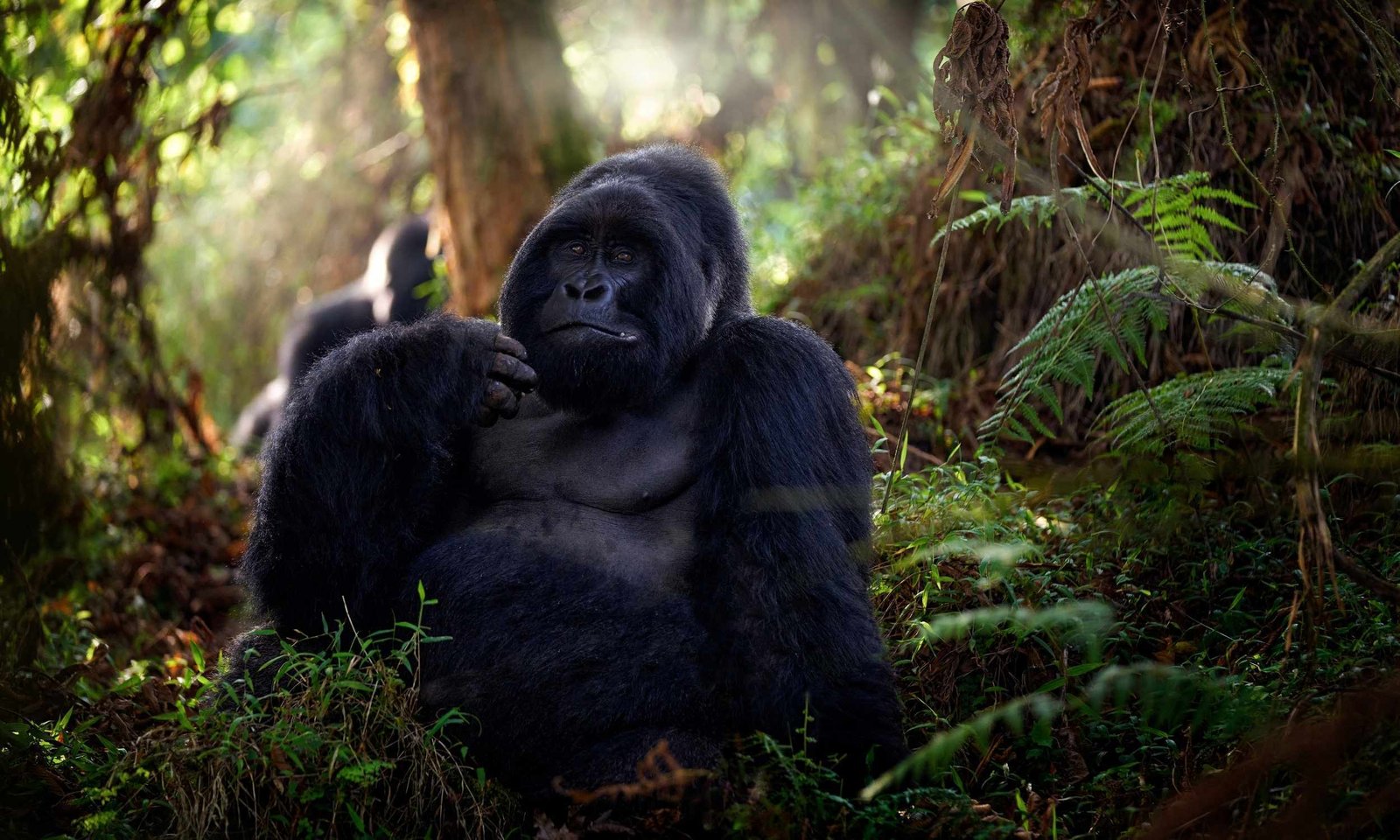
Talk To a friendly team
Africa Safaris
Safaris By Type
Top Safari Parks
Help & Info
- About us
- Travel Blog
- Travel FAQS
- Gorilla Permits Bookings
- Contact Us
- Pay Online
